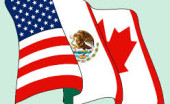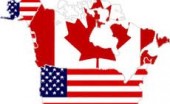Johannah Bernstein post: "eternally proud of my father’s extraordinary aeronautical engineering. legacy. here is a photo of the Canadair Water…
Wednesday Night #1432
Written by Diana Thebaud Nicholson // August 12, 2009 // Arctic and Antarctic, Cleo Paskal, Climate Change, Education, Herb Bercovitz, Peter Trent, Public Policy, Reports, Science & Technology, Security, Wednesday Nights, Westmount // Comments Off on Wednesday Night #1432
Work in progress – more to come
With glittering representation from the Federal and municipal levels of government, academia, business, science and technology, education, research and just about any other area of expertise (or government intervention), this was a lively and enlightening Wednesday Night. Aside from Canada’s First Astronaut and the Once and Future Mayor of Westmount, both of whom who also represent a number of the afore-mentioned sectors, we were joined by an SRO group that included several new faces. Professor Michael Avedesian, another polyvalent – a ‘serial entrepreneur’ – currently teaches at McGill’s Faculty of Management and served as interim head of the OTT Business Development group. Samad Qadri, an aerospace engineer with 30 years of experience who has held major project management responsibilities for Bombardier, and expert on wireless data communication systems, holds several patents in the field; Gabriel Bran Lopez, in-coming Sauvé Scholar is the founder of Youth Fusion, an award-winning non-profit organization that works in Quebec high schools to counter drop-out rates.
‘Innovation’ – to some means new ideas, new discoveries, while to the practitioners, it is a process that takes knowledge and translates that knowledge through a long process into useful products or services.
Last week, we heard a labor economist state that there is virtually nothing that Canada can sell to the world if, as is anticipated, the Canadian dollar rises above 92.5 cents U.S. The underlying reason is directly related to productivity; studies trace back to the supposed lack of technology-based innovation in Canada and its application to the way we do business. Canada’s productivity growth rates are low in comparison to our trading partners, which is generally seen as a failure of innovation policy.
This may be attributable to the difference between the American and Canadian psyche. Whereas Canadians prefer to be “nice”, Americans tend to be innovators, entrepreneurs, risk takers, competitors. We have an easier, different lifestyle than do Americans. Our social structures and social net are different as is our style of entrepreneurship.But how to explain the success of the Scandinavian countries – with a culture similar to Canada’s – and far more impressive credentials in innovation?
Recent studies by the Council of Canadian Academies Innovation and Business Strategy: Why Canada Falls Short and the Science, Technology and Innovation Council (STIC) State of The Nation 2008 – Canada’s Science, Technology and Innovation System have come to the same conclusion that the Conference Board reached some 15 years ago: Canada is a prosperous country, but not one that is based on innovation.
Canada does not have a single measurable comparative advantage in any advanced technology.
That is the bad news. The good news is that Canada ranks high in terms of world performance for the front-end of the innovation process: the idea generation, discovery, inventions and patents.
It would appear that the principle reason that our chartered banks have escaped the recent U.S. meltdown relates to their reluctance to take risks in lending money to entrepreneurs for new ideas that would continue to keep Canada on the map. Certainly the talent is here, but it seems that creativity is not considered capital. With the absence of funding for creativity, entrepreneurs must inevitably look to the U.S. or U.K. for venture capital. Although the Canadian government is willing to provide some funding, the process is long and clumsy and the need usually more immediate.
Unlike other countries, Canada appears reluctant to act to keep innovative companies here. This implies that not only are such companies as Alcan, Inco, Nortel or AECL permitted to disappear from Canada but, more importantly, the talent that created them as well. When an innovative company is permitted to leave, its creative talent, innovation, research and development leave with it. With the apparent imminent disappearance of Nortel, its leadership in fourth generation wireless technology will go too. Although Ericsson Canada is considered a model Canadian corporate citizen, it would be unthinkable for Sweden to permit that company to emigrate. [See Marc Garneau’s letter to Minister Clement urging review of the Nortel sale] – UpdateOttawa signs off on Nortel-Ericsson deal
Probably Jean Chrétien’s greatest legacy is the creation of the Canadian Foundation for Innovation, the Canada Research Chairs, Genome Canada, the indirect costs support program for Research – all to invigorate research in the public domain.
It is not that Canadians are not creative. (President Obama carries a blackberry). Of the twenty-nine billion dollars that we spend annually on research, 35% is spent on universities , more than any other OECD country. Where we fail is in converting ideas into entrepreneurs and venture capital. What we lack is the culture of risk so prevalent in the U.S. We are good at the creation of programs to reinvigorate innovation in the public domain. A significant part of the problem is the very poor availability of venture capital, partly because we live in a low-risk and high-return culture, the reverse of the U.S. It would appear to be a cultural problem in Canadian companies which tend to not plough some capital back into innovation.
[Update: Canada Loses Out As U.S. Ups Green Ante
(Reuters/Planet Ark) The Obama administration’s titanic $60 billion spending plan for the U.S. clean energy sector is luring investors away from green businesses in Canada, threatening the industry’s growth here.
Already battered by recession and tight credit markets, Canada’s renewable energy and clean technology companies must now compete for investment with their U.S. peers, who have an unprecedented cache of federal cash grants and tax incentives. A start-up, whether it makes turbines for wind farms, solar panels or electric cars, may think twice before setting up shop in Canada, curbing the country’s ability to create jobs and generate tax revenue, and losing technological innovation.]
AECL
We have lost our edge in the nuclear industry but it is believed that it is worth fighting to regain our once dominant position. While some Wednesday Nighters are of the opinion that we should work with France to build the next generation of fast breeder nuclear reactors, others believe this would take almost a half century to achieve whereas the development already achieved in the dishwasher size Maple nuclear reactors warrants the attempt to work on a paradigm to solve the perceived safety issues and to market the Maple.
Although Wednesday Nighters have not given the current federal government high marks on ensuring Canada’s continuing dominance in fields in which we have excelled, they applaud the government’s continuing determination to maintain our sovereignty over Canadian Arctic territory.
Petrus praefectus quondam et futurus
The announcement that Peter Trent is seriously contemplating a return to municipal politics has been welcomed by Westmounters and wannabes alike. His unwavering refusal to compromise his principles, his ability to attract talented people to work with him – frequently at a sacrifice in their professional life – as well as his talent in achieving a consensus between citizens and colleagues with differing points of view have earned him wide respect.
Quotes of the Evening
“Canadians care about money, Americans make money.”
“The clash of cultures is what makes Canada successful.”
Canada’s apparent inability to successfully innovate has been a frequent Wednesday Night topic – most recently on June 24, which prompted the following exchanges.
One Wednesday Nighter wrote: “If we are to promote innovation we must invest not only in what there is, but also in what there may be, by ensuring a sound, compulsory education in science from childhood on up. What child has not longed to play Doctor , or be a fireman, or an astronaut? We could monetize that early curiosity into a productive culture of innovation to the benefit of future generations of leadership candidates as well as science.”
Further thought was stimulated by Tom Friedman’s recent column: Invent, Invent, Invent : “When times are tight, people look for new, less expensive ways to do old things. Necessity breeds invention. Therefore, the country that uses this crisis to make its population smarter and more innovative — and endows its people with more tools and basic research to invent new goods and services — is the one that will not just survive but thrive down the road. We might be able to stimulate our way back to stability, but we can only invent our way back to prosperity. We need everyone at every level to get smarter.”
A second Wednesday Nighter gave this thoughtful response:
As to invent, invent, invent: the US already has plenty of ‘inventions’–about 40% of the world’s patents. Canada is relatively less inventive, but invention is not innovation. Canada’s main problem is organization–Canada does not have the institutions and mechanisms of other small countries living next to much larger advanced country markets, nor does our political system seem able to deal with that on a country-wide level. Nortel grew up in the shelter of Bell and had world-leading technology already deployed before being freed to face capital markets on its own in the mid-1990s. Its most durable contribution was as an incubator for Ottawa’s ICT spinoffs many of which are still doing OK in highly specialized niches. Even in its last days, Nortel’s R&D spending was close to that of the rest of the ICT sector as a whole. In the furor over the isotope mess-up, few observers are seriously asking why a consortium of Canadian investors failed to emerge to turn it around and re-position it for an ICT-rich future (despite the fact that a cocked up, over-priced deal for Bell itself was put together a year or so earlier). Canada has/had the pre-requisites to build global companies in non-carbon energy (hydro, ‘clean’ coal (transitional) and nuclear energy), water management (especially in “smart” municipal infrastructure) and advanced medical technologies, especially linked to bio and nano tech applications. This in addition to strengths in aerospace, underground mining technology and multimedia. How many chances does a small country need? Yet we continue to live off a 19th century resource-based trading mix with an S&T funding system that is basically unchanged since the 1970s with a resultant long-term decline in productivity growth and living standards relative to more innovative economies. Two big differences between now and the 1970s are (i) that government subsidies have almost completely crowded out industrial R&D except for local adaptation of products and services developed elsewhere and (ii) overall levels of R&D spending are declining relative to GDP. If we’re trying to reduce complex interactions to mantras, then Canada’s –rather than ‘invent, invent’–should be ‘organize, organize’ –and fix the tax system–like Finland, Sweden, Japan…and even the US.
I N V I T A T I O N
This Wednesday, we welcome back our friend and M.P. Marc Garneau, with his wife Pamela (a first for her). Plus the Once-And-Future Mayor – or as he would have it – Petrus praefectus quondam et futurus – of Westmount, Peter Trent (He’s back! Trent prepares to run)
Marc, as many of you know, thinks highly of the assembled expertise of Wednesday Night. Let us not disappoint him! This is an opportunity to share with him your experience, opinions and recommendations on a number of issues and files in which he and we are interested.
In particular, we have in mind Science & Technology, Research & Development, Innovation, the Arctic, Industrial and environment policy, including issues related to climate change and security, and Canada’s policy on nuclear power, isotopes, AECL and the MAPLEs. We would also add Foreign Affairs, G8/G20 and the NAFTA (Three Amigos) Summit . More specifically:
— as the U.S. recognizes the relationship between Climate Change and Security – an issue that Cleo Paskal and IISD have long been writing on – how is Canada positioning itself internationally and especially with respect to the Arctic
— Does Canada have an industrial strategy (especially vis à vis foreign investment) – while there have been a number of foreign acquisitions in the energy sector, the Nortel-Ericsson-RIM flap is causing consternation. Should it? “A parliamentary committee will hold emergency hearings this week into the ongoing auction of the assets of Nortel Networks Corp., and opposition MPs say they will press the government to spell out its long-term strategy for Canada’s high-technology sector.”
— We supported Marc Garneau’s stance – and the government’s subsequent action – on the sale of MacDonald Detwiler (MDA) to ATK , but what are the rules?
— AECL and nuclear energy is a topic debated regularly at Wednesday Night and about which there is a lot of knowledge, although not necessarily agreement, but no-one believes that Canada should walk away from its acquired experience.
— Science education. Tudor Johnston, (co-author of “Survival Skills for Scientists“), who unfortunately cannot be with us, sends the following suggestions for an inexpensive way for the Federal Government to get the attention of 10-12-year olds to the possibilities of a career in science.
“Address this via the NSERC Discovery Research Grants which are a vital component of the research funding. The idea is to add to the list of activities which help qualify the researcher for the research support they seek, in the category of what is called training of ‘highly-qualified personnel’ or HQP. This is normally limited to presenting their direct activities with their own graduate students and postdoctoral fellows. Why not, in this existing HQP category of direct efforts with postgraduate personnel, also include evidence of any efforts by the applicant in the way of outreach in secondary schools for proselytizing scientists.” Tudor adds: “As it stands now this is kind of activity is often regarded as something which is a distraction from real science training such as lecturing and research. By adding this to the list of desirable HQP activities in research, this would help those who engage in this outreach to justify it to their funding agencies, colleagues, department heads, deans and the like.”
— Foreign Affairs under the current administration appears to be haphazard and inept at best, or as the LPC website puts it: Harper foreign policy agenda running on empty . Of course, the big issue currently is the Buy American policy -what more Ottawa can do, even with the support of the premiers. We could also take a look at the complementary issue of Immigration (asylum, visas, etc.) and how Canada protects its citizens abroad
And finally, this item from the New York Times – an excellent thoughtful dialogue that makes some very good points.
Are Liberals More Corrupt?
By Gail Collins AND Ross Douthat
Large government doesn’t mean corruption is automatic.
G.C.: There are a lot of things that can make a local government or political party go bad. You seem to feel that if government is large, it happens automatically but I just don’t buy it. Look around the country and the world and you’ll see many big places, and big government programs, that work cleanly and efficiently. It depends mainly on how much voters expect of their public servants, and how quickly they’re prepared to punish them if they fall short.
R.D. I don’t think that the size of government is the only factor in creating corruption. The design of public institutions matters. The existence of news media outlets and watchdog groups matters. How much you pay your public servants matters. And culture probably matters most of all. One of my favorite studies from the last few years looked at parking tickets for diplomats in New York, who of course can get away with leaving them unpaid because of diplomatic immunity. The Kuwaitis averaged 246 unpaid tickets per diplomat per year; the Swedes averaged zero.



